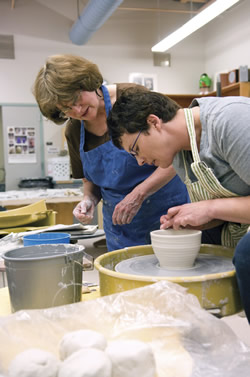by Betsy Cheney ’89, ’99G, photos by John Anderson
In the dusty industrial-looking pottery studio tucked into a back corner of the Draper & Maynard Building, pottery wheels whirred, and students and faculty slapped and kneaded bulk clay to ready it for “Bowl-a-palooza”—a six-hour bowl-making marathon for Empty Bowls, an event that raises funds to help fight hunger.
Leading the effort—which ultimately produced just over 100 bowls—was Professor of Ceramics Susan Tucker, who, elbow-deep in clay herself, talked about discovering her dual passions of ceramics and teaching, and her thoughts on her upcoming retirement after 26 years teaching ceramics at PSU.
Tucker discovered her interest in ceramics while taking post-baccalaureate art classes at Georgia State University. Wanting to inspire such passion in others, Tucker began teaching non-credit ceramics classes at a private art school in Virginia. It was during this time that Tucker discovered yet another passion: teaching young adults. “I like the rapport you can develop with them,” she says. “They are responsible and independent, and I can hold them accountable.”
With the goal of teaching college-level art full time, Tucker pursued her MFA at the University of North Texas. After earning her degree, she filled in for faculty on sabbatical in schools in Ohio and Pennsylvania while seeking a more permanent position. “I wanted a small college town,” she says.
Although initially reluctant about the northern climate, Tucker quickly found that Plymouth, and Plymouth State, were a great fit for her. “As a southerner, I was afraid of winter, but I immediately felt at home in Plymouth,” Tucker recalls. “Friends taught me how to construct a woodpile and build a fire, and wear socks with sandals!”
Over the years, Tucker has taught both hand building and throwing (creating pieces using a potter’s wheel), and has always looked for ways to challenge herself. “At one point I took a painting class in abstract art to freshen my perspective,” she says. “I also turned to [creating] nonfunctional vessels for a while—sculptural pieces that were more about the material than about utility.”
 For Tucker, one of the most enjoyable aspects of her work is the communal feel of the pottery studio at PSU. “We share clay and wheels and kilns, and successes and failures,” she says. “We play off each other, and the energy rises and falls, and we talk.”
For Tucker, one of the most enjoyable aspects of her work is the communal feel of the pottery studio at PSU. “We share clay and wheels and kilns, and successes and failures,” she says. “We play off each other, and the energy rises and falls, and we talk.”
This casual talk often proves to be as valuable as planned lessons. “Students ask about what I am working on,” she says. “That gives me a chance to talk with them about taking commissions and displaying work at craft fairs, and the difference between showing and selling. Sometimes you will sell what you might not show, and vice versa.”
According to Tucker, events like Bowl-a-palooza and the biannual department pottery sale, which benefits PSU’s Ceramics Scholarship Fund, also create teachable moments. Students learn about donating pieces, making saleable pieces, and setting prices that are fair to the public as well as to themselves. “Sometimes students underprice their work from a lack of confidence or overprice it through inexperience,” Tucker says. “I encourage them not to underprice their work, and explain that overpricing hurts the market.”
With her retirement approaching, Tucker plans to make functional pieces for a while—objects that she says won’t just sit around and collect dust. “I like the intimate exchange between artist and user—connecting with everyday life,” she says. And while she’s eager to devote herself full time to her art, she says, “I’ll miss the camaraderie of the pottery studio at PSU.”











